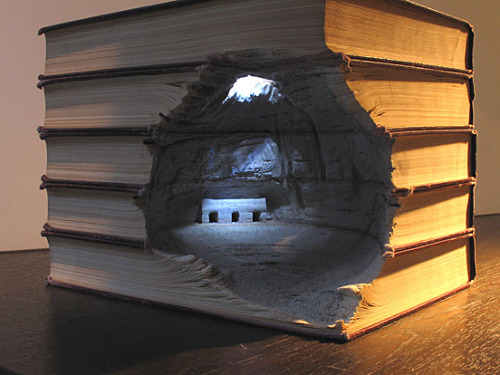knitwit1912: friedcheesemogu: ktopless: a—psychedelic—mess: these are beautiful, but why
knitwit1912: friedcheesemogu: ktopless: a—psychedelic—mess: these are beautiful, but why would you ever do this to a book? ^this Okay this is something I have to answer because as a bookseller, as a bookseller working in a used bookstore, this is something I have to deal with daily. People get mad at me or express something like profound disappointment when I indicate that we recycle what we can’t use, and some of that recycling is the employees using books to make art and/or crafts like purses, buttons, collages, jewelry, etc. You know why we do it? Because we love books. We recycle them so they can be made into new books by a company that we pay to do exactly that. We make them into art because sometimes there is nothing else you can do with them and the thought of just getting rid of them seems like a waste. You may love books and hate to see them “destroyed,“ but tell me what you, personally, are going to do with a full set of Encyclopedia Britannica from 1994? That’s 26 books of outdated information. When you have a stack of Twilight books that is literally two feet tall, is it really absolutely necessary to preserve the integrity of their bookiness? Or might it be more worthwhile to give them a second life? As a new book, as art, as something other than an object that takes up space in a store where we need as much as possible to sell the books you love and that we love too. I wouldn’t do this to, say, the Gutenberg Bible or a first edition Virginia Woolf, but something we see several times a day every day? Art is a pretty good fate for an otherwise unsaleable book. No one is asking you to make incredible mountain ranges out of the books you love. But please consider that same love might have something to do with why people make the things they do out of books. As someone who works in a public library and does weeding, thank you. Eventually, there are books that no one wants to read. If they’re outdated, at best they’re irrelevant, at worst they can be *dangerous* because the information in them may be completely contrary to what is currently believed by experts to be safe or healthy. The only thing they do on our shelves is take up space, space that we need for *new* books. Books have a life cycle, like everything else. At the end of theirs, they can be reborn as art, or as recycled paper for more books, more information or stories to inform and entertain. -- source link
Tumblr Blog : iamthecollage.tumblr.com
#so yes



